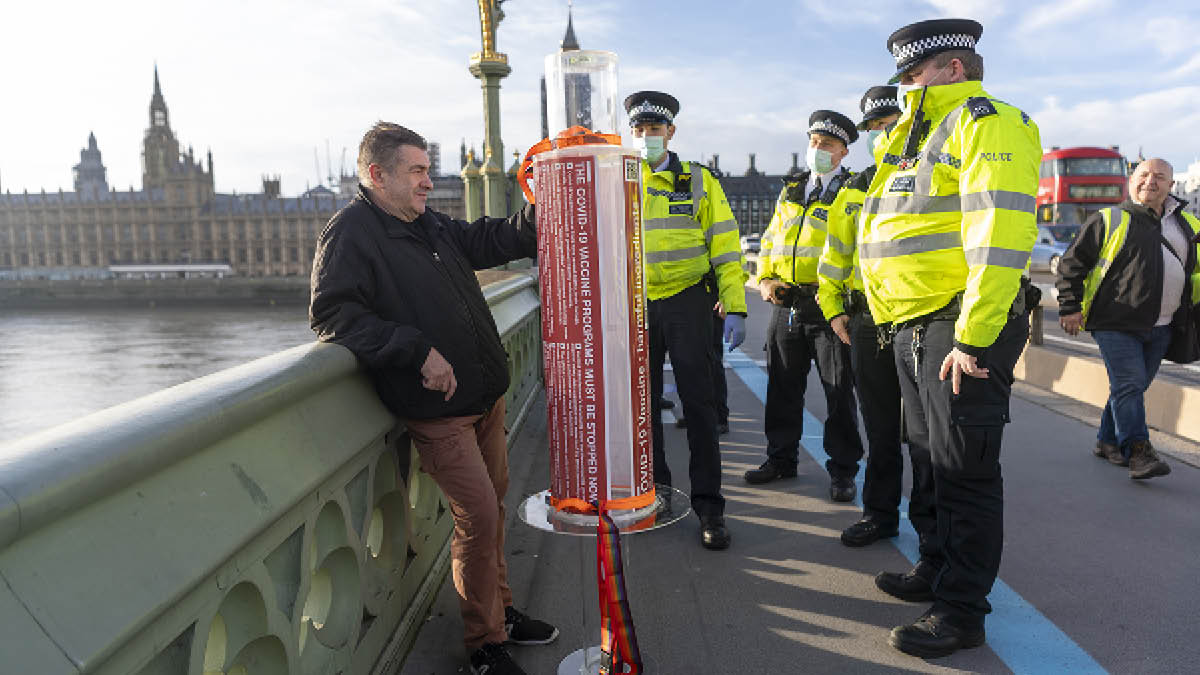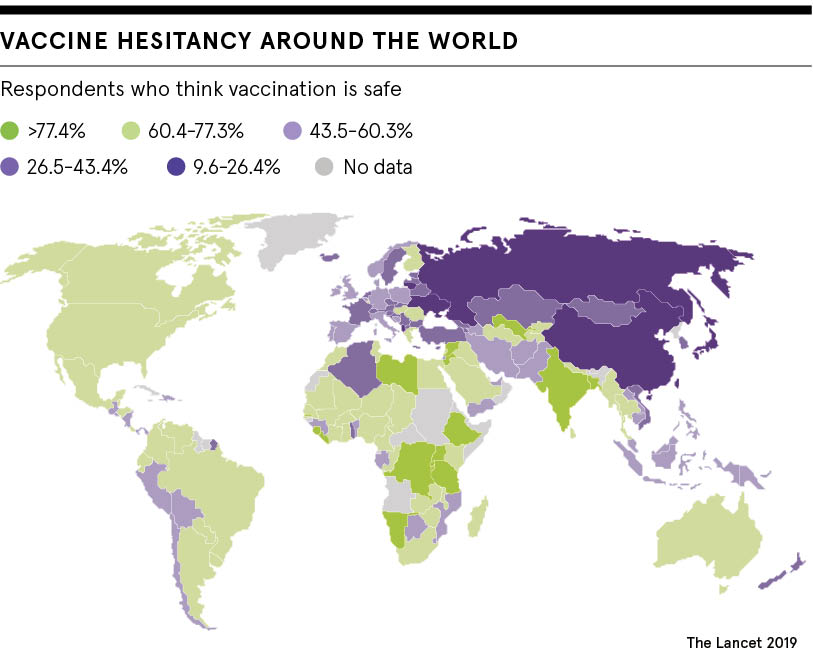
In 1796, Edward Jenner administered the world’s first successful vaccine. It is considered one of the most important medical breakthroughs in history, but not everyone was happy about the smallpox jab at the time. Jenner was widely ridiculed and tens of thousands of people later took to the streets to protest against compulsory immunisations for the “speckled monster” disease.
Since the English doctor’s discovery, vaccines have cut rates of infectious diseases all over the world. But for all their success, many still don’t trust them. The World Health Organization (WHO) lists “vaccine hesitancy” as one of the top ten threats to global health. It says 1.5 million deaths could be avoided if more people had access to vaccinations.
In the UK, there’s been a worrying resurgence of measles in the last few years as some parents refuse the MMR vaccination for their children. Vaccine hesitancy could also be a dangerous hurdle in the pandemic. On Dec 2, the UK became the first country in the world to approve the Pfizer/BioNTech Covid-19 vaccine. But alongside sorting the logistics of manufacturing and distributing a jab for millions, experts will have to convince ordinary members of the public that the discovery the world has been waiting for is safe.
Public health experts estimate that up to 80 per cent of people will need to be vaccinated to reach population immunity. This will be hard to achieve if too many are unwilling. A British Academy and Royal Society report found around 36 per cent of people in the UK and more than half of those in the United States are either “uncertain” or “unlikely” to be vaccinated against COVID-19.
Vaccines work but conspiracy theories abound
Within hours of Pfizer and BioNTech announcing early results showing their coronavirus vaccine had 90 per cent effectiveness, “Bill Gates” began trending on Twitter. Some conspiracy theorists claim the Microsoft founder is using the pandemic as cover to implant humans with trackable microchips.
But Dr Heidi Larson, professor of anthropology at the London School of Hygiene & Tropical Medicine, believes vaccine hesitancy is a more nuanced problem than this fringe, and completely false, view. More insidious claims about immunisations are those that sound credible, but come to the wrong conclusions and create a narrative of doubt. “I think the problem is harmful misinformation and the fact we have a very distrusting and anxious public,” she says.
Larson and colleagues surveyed 4,000 people in the UK about their attitudes towards a COVID-19 vaccine. Some 54 per cent said they would take it. But when the participants were exposed to some of the most frequently circulating vaccine rumours on social media, this dropped by 6.4 percentage points. The research, which has not yet been peer reviewed, suggests the impact of misinformation should not be underestimated. “At 54 per cent, we’re already wobbling on or below herd immunity,“ says Larson. “So all it takes is a few percentage points to knock it down. And that’s why we’re so vulnerable.”
Kolina Koltai, a researcher from the Center for an Informed Public at the University of Washington, says vaccine hesitancy could be more prevalent than we realise because research on this subject has tended to focus on parents with young children. For a successful COVID vaccine rollout, more people will have to be on board.
“I think there are a lot more people who haven’t necessarily thought about vaccines, who will be hesitant to take this vaccine,” she says. Speed of development and uncertainty around side-effects are two quite reasonable worries people might have. Although the scientists leading the trials haven’t taken short cuts on safety, never before has a vaccine been developed so quickly. “You might see people say, ‘I’m pro-vaccine, but I’m not sure about the COVID one’,” says Koltai.
Is social media to blame for rising vaccine hesitancy?
Like Larson, Koltai believes misinformation circulating on social media could exacerbate the problem. “There’s been backlash ever since there have been vaccines. But social media makes it easier to connect with people who hold these sorts of views and there hasn’t been much moderation on these platforms in terms of combating vaccine misinformation,” she says.
Anyone could be anxious about immunisations, but there’s some evidence that anti-vaccination groups are likely to target marginalised communities. For instance, a 2017 outbreak of measles in Minnesota was found to be fuelled by extremists influencing a Somali community, using a widely debunked claim from the 1990s that the MMR vaccine causes autism.
Context is key though. People are not “empty vessels” absorbing information put out by campaigners or public health authorities, says Melissa Leach, director of the Institute of Development Studies. “They will always interpret this in the light of their own experiences, community relationships and their broader trust in state and global agencies and authorities,” she says.
Gender, ethnicity, class and many other factors shape who hesitates. In some US polls, black Americans have been particularly sceptical about a COVID-19 jab. Longstanding racial biases in medicine could explain why. Many African-American men died of syphilis in the infamous Tuskegee Study which ended in 1972. For 40 years doctors had willingly monitored men they knew wouldn’t survive without treatment in a US government trial. The participants had been told they were getting free medical care and were never informed they had the sexually transmitted disease.
Ethnic minorities are under-represented in clinical trials to this day and many people cite the Tuskegee experiment for their reluctance to participate in medical research. Trust in a COVID-19 vaccine is important for everyone, but especially those at greater risk of experiencing severe illness with the virus. Official figures have confirmed black people are more than four times as likely to die of COVID than white people.

Steps for a successful public health campaign
Access is another concern, says behavioural scientist Dr Alice Forster from University College London. Practical issues disproportionately affect people on lower incomes, she says. Studies on childhood immunisation have found travel to a clinic and problems getting time off work can prevent a parent vaccinating their child. Language barriers are another stumbling block. “Making sure the whole population is getting equitable access needs to be a focus,” says Forster.
Lack of empathy is part of what’s alienating people around vaccines; we need to be extra sensitive in the context of COVID
Efforts to tackle vaccine hesitancy and ease anxieties are critical if we are to snuff out the pandemic. The Labour Party is calling for financial penalties for social media companies that don’t remove false scare stories about vaccines. But Forster believes leaders need to not only address circulating misinformation, but generate an open dialogue that does not dismiss people’s very real concerns.
Health workers are likely to play a key role in encouraging and reassuring the public. “We know the general public really trusts health professionals and being able to sit down and have these detailed discussions would be a real benefit,” says Forster. That the UK’s deputy chief medical officer Professor Jonathan Van-Tam said he’d be “at the front of the queue” for the COVID-19 vaccine if he could might be a good starting point.
Getting the vaccine should be made as convenient as possible and messaging must be available in multiple languages. But Larson’s big worry is what happens when someone who has had the vaccine experiences complications. Mishandling the communication around an adverse event, even one later found to be unrelated to the coronavirus jab, could be a disaster for public trust. The government will need to address any potential side-effects transparently with the public. “Lack of empathy is part of what’s alienating people around vaccines; we need to be extra sensitive in the context of COVID,” Larson concludes.
